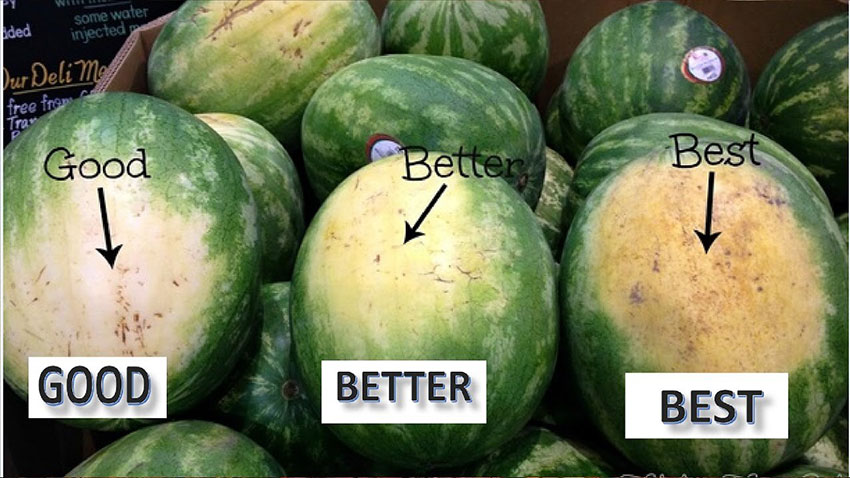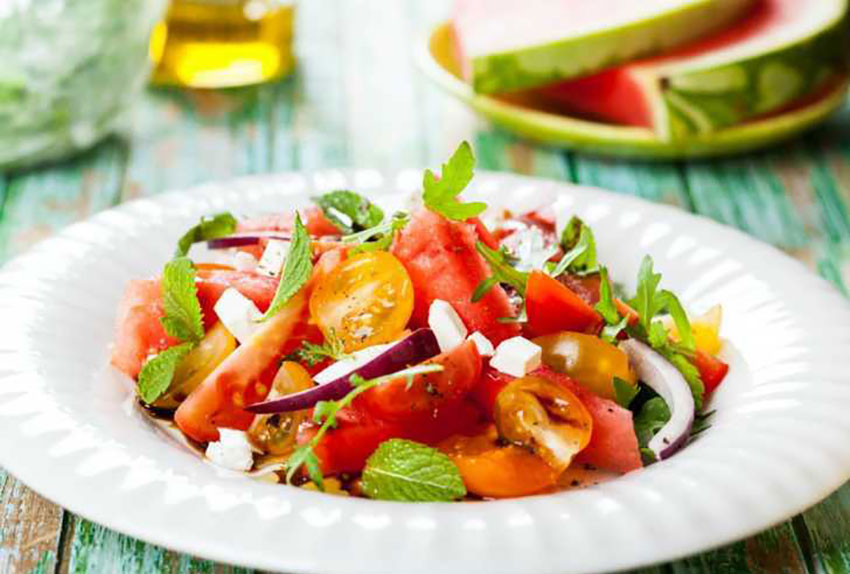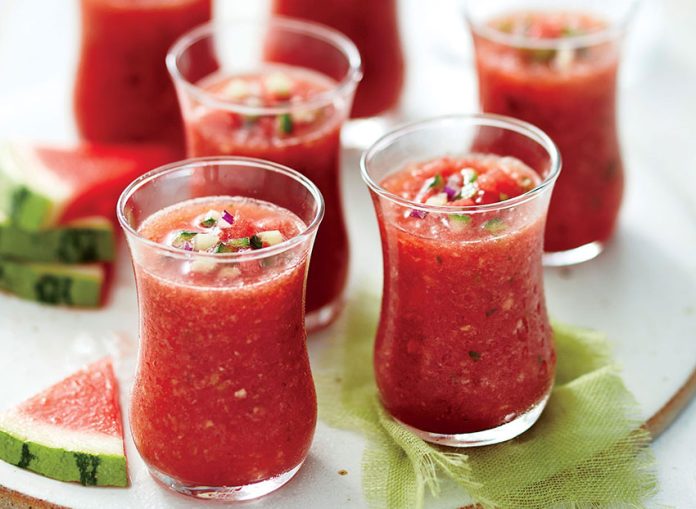Everybody wants to know the same thing about watermelon: how to pick a good one.
I’ve relied on my farm-girl mother’s advice about looking for a hollow sound when you tap it. Turns out there’s a handful of other things to look for in your quest for the perfect sweet, juicy sandía. While there are many varieties of watermelon, these parameters work for all of them.
Let’s start with appearance. See that one that looks shiny? Not ripe. You want a watermelon whose rind is dull or matte-looking, with a dried-up stem. (Extra points if it’s curly!) Don’t pick one with a green stem — it was picked too soon and won’t have had time to develop the sweetness you’re looking for.
Another indication of sweetness is a watermelon with lots of webbing (those dry-looking trails on the rind), which forms when bees touch the flower.
One more telltale sign is the splotch on the bottom of a watermelon where it sat on the ground. You want a “field spot” that’s creamy yellow —not white, and not beige. That was a new one for me.

Next, pick up the watermelon you’re leaning towards. The sweetest, juiciest ones will be heavy for their size. You’ll have to pick up several melons about the same size to get a sense of an average weight. And heavy doesn’t necessarily mean big: experts say the best watermelons are average sized, “just right” for their variety. Now, give it a thump. You should hear that hollow sound my mom told me about, not a sharp ping.
And finally, you want a female watermelon. Huh? Male watermelons are taller, longer and more watery, while females are rounder and sweeter. This doesn’t apply to seedless varieties or some hybrids, which are all the same gender-free shape.
In Mexico, watermelons are grown in several states, with Sonora, Colima and Nayarit being the biggest producers. While the majority are exported to the U.S., sandías are still plentiful, delicious and inexpensive all throughout Mexico.
I’ve always wondered why watermelon has its own distinct word in Spanish —sandía — while all other melons (cantaloupe, honeydew, Gaia) are lumped together with the word melón. I spent some time trying to figure this out and the most I could find has to do with the origin of the fruit itself.
Historians say watermelon most likely came from the Kalahari Desert and the Nile River Valley, where its seeds were found in some of the pharoahs’ tombs.
Etymologically speaking, though, it’s the Arabic word for watermelon — sandiyya, indicating it came from Sindh, an area of eastern Pakistan that’s thousands of miles from Egypt and even further from Spain — that is the root of modern-day sandía in Mexican Spanish. Así es.
Watermelon Margarita
This makes just one cocktail — double or triple if you have company.
- Kosher salt
- 1 lime wheel
- 3 oz. fresh watermelon juice
- 1½ oz. tequila blanco
- ¾ oz. fresh lime juice
- Watermelon wedges
If desired, salt the rim of your glass by rubbing lime juice around the rim and then dipping in salt. Combine watermelon juice, tequila and lime juice in a shaker. Fill shaker with ice, cover and shake vigorously, about 20 seconds. Strain into prepared glass. Garnish with reserved lime wheel and a watermelon wedge.
Watermelon & Tomato Salad
Pretty, refreshing and delicious, this salad is perfect for a hot summer day.

- 4-6 ripe, juicy tomatoes, cut into 1¼ -inch cubes OR 1 pint cherry tomatoes
- 1 small seedless watermelon, cut into 1¼ -inch cubes
- ¼ red onion, sliced thin
- 1 tsp. salt
- ¼ cup olive oil
- 2 Tbsp. sherry, rice wine or red wine vinegar
- Salt and freshly ground pepper to taste
- 1 cup feta cheese, crumbled
- 2-4 Tbsp. julienned fresh mint or basil leaves
Combine tomatoes, onion and watermelon in a large bowl and toss gently. Add 1 tsp. salt and let stand 5-10 minutes while you prepare dressing. Whisk the oil and vinegar, add herbs and season with salt and pepper. Add feta to the tomatoes and watermelon, add dressing, and toss gently to combine. –nytimes.com
Easy Watermelon Gazpacho
Serve in shot glasses as an appetizer, garnished with a sprig or parsley, mint or cilantro.
- 2 large tomatoes, puréed
- 1-2 jalapeños or serrano chiles, veins and seeds removed
- 4 cups seeded, cubed fresh watermelon, divided
- 2 tsp. red wine vinegar
- ½ cup extra-virgin olive oil
- ¼ cup minced red onion, plus more for garnish
- 1 cucumber, seeded and minced
- 2-3 Tbsp. minced fresh dill, parsley, cilantro or a combination, plus more for garnish
- ½ cup crumbled queso fresco, feta cheese or plain yogurt
- Kosher salt and freshly ground black pepper
In a blender, purée tomatoes, chile and half of the watermelon. Add vinegar and olive oil and pulse. Add onion, cucumber and herbs; purée until smooth. Season with salt and pepper. Pour into bowls or shot glasses and garnish with herb springs, feta and remaining watermelon cubes, cut into bite-size cubes.
Watermelon Granita
- 8 cups watermelon chunks, seeds removed
- 2-4 limes, juiced
- 1/3 cup sugar
Place half the watermelon, half the lime juice and half the sugar in a blender. Process until smooth, then pour into a bowl. Repeat with other half of ingredients; add to same bowl.
Transfer mixture to a 9×13 glass baking dish. Freeze for two or three hours, then begin the process of scraping the layers. Using a fork or spoon, scrape the top frozen layer and return pan to freezer with the shaved ice on top. Continue scraping the top layer about every 2 hours until the entire mixture has been scraped and you have a dish full of fluffy granita. Cover and store in freezer until serving.
Janet Blaser has been a writer, editor and storyteller her entire life and feels fortunate to be able to write about great food, amazing places, fascinating people and unique events. Her first book, Why We Left: An Anthology of American Women Expats, is available on Amazon. Contact Janet or read her blog at whyweleftamerica.com.
